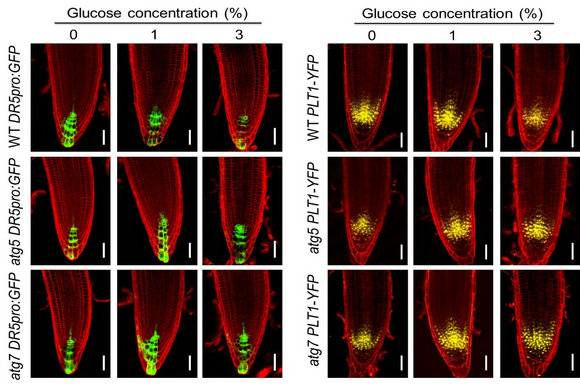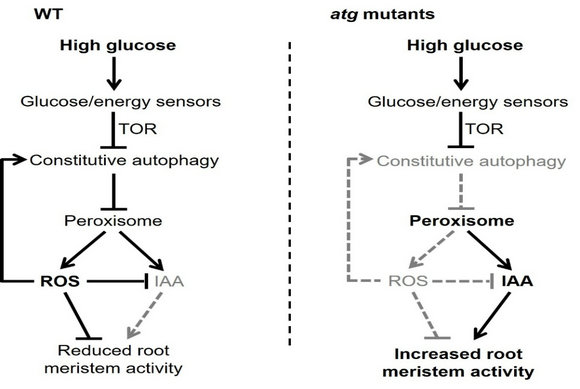Prof. Shi Xiao’s group at School of Life Sciences reveals a new mechanism of autophagy in regulating the plant root meristem activity
Source: School of Life Sciences
Written by: School of Life Sciences
Edited by: Wang Dongmei
Recently, Professor Shi Xiao’s group at School of Life Sciences, Sun Yat-sen University published a research paper entitled "Autophagy Regulates Glucose-Mediated Root Meristem Activity by Modulating ROS Production in Arabidopsis” on
Autophagy (IF 11.1), which reveals a new mechanism of autophagy in regulating the plant root meristem activity. This study demonstrates that by maintaining the cellular homeostasis of reactive oxygen species (ROS) and auxin (Figure 1), the root-specific constitutive autophagy plays a key role in the high glucose-mediated inhibition of root meristem activity through the interaction between ATG8 protein and peroxisome transmembrane transporter ABCD1. These new findings illustrated the molecular link between the energy metabolism and autophagy pathways, and enriches the glucose-mediated signal transduction pathways in the plant cells. This research was independently done by Professor Shi Xiao's group at the School of Life Sciences, Sun Yat-sen University. Li Huang and Lujun Yu were the co-first authors and Prof. Shi Xiao was corresponding author of this paper.

Figure 1. Comparison of the expression levels of auxin biomarker (DR5pro:GFP) and meristem biomarker (PLT1-YFP) in the wild-type (WT) and atg mutants, following exposure to the gradient concentrations of glucose.
Roots are vital systems that enable plants to cope with the continuously changing environment, in addition to their basic roles in taking up water and nutrients from the soil. The primary roots are formed by the balance of cell division and differentiation, and their growth, development, and regeneration are predominately determined by the root meristem, whose stem cell activity is maintained by several factors, including hormonal levels (e.g., auxin) and ROS homeostasis (e.g., H2O2 and superoxide). Previous studies have demonstrated that glucose produced during photosynthesis functions not only as the fundamental fuel for cellular metabolism, but also as a hormone-like signaling molecule to regulate diverse developmental and physiological activities. More recently, researchers have found that glucose transports from shoots to roots, leading to inhibition of the root growth via regulating root meristem activity, but the underlying mechanism remains poorly understood. Here, the researchers show that in response to glucose signal, the constitutive autophagy in Arabidopsis roots functions downstream of the glucose sensor HXK1 and energy sensor KIN10. Through interacting with ABCD1, autophagy plays an indispensable role in the glucose-promoted degradation of root peroxisomes, ROS balance, and auxin level in root cells. Together, these findings suggest that autophagy is an essential mechanism for glucose-mediated maintenance of the root meristem (Figure 2). This study reveals for the first time the important biological function of autophagy in the regulation of root meristem activity, which is of great scientific significance for in-depth understanding of the crosstalk between glucose signaling and autophagy pathway.

Figure 2. Proposed model for the role of autophagy in regulating the glucose-mediated suppression of root meristem activity.
This work was supported by the National Science Fund for Distinguished Young Scholars, National Natural Science Foundation of China (General Program), International (Regional) Joint Research Program of China, and Major Nurturing Natural Science Foundation of Guangdong Province, China (Major Program).
Link to the paper:
https://doi.org/10.1080/15548627.2018.1520547
